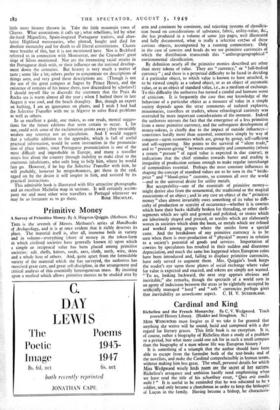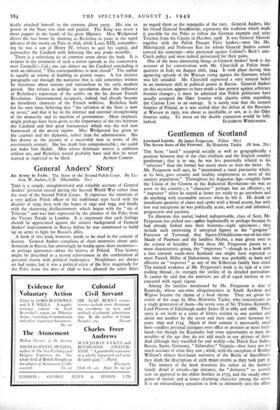Cardinal and King
MISS WEDGWOOD must forgive us if we take it for granted that anything she writes will be sound, lucid and composed with a due regard for literary graces. This little book is no exception. It is, of course, rather a biography of Richelieu than a study of a problem or a period, but what more could one ask for in such a small compass than the biography of a man whose life was European history ? It is something of a triumph that the author should have been able to escape from the formulae both of the text-books and of the novelists, and make the Cardinal comprehensible in human terms, without making him less great. The small, personal details for which Miss Wedgwood wisely finds room are the secret of her success. Richelieu's arrogance and ambition hardly need emphasising when we have read the title of his schoolboy essay, "Quis erit smiths mihi ?" It is useful to be reminded that he was educated to be a soldier, and only became a churchman in order to keep the bishopric of Lucon in the family. Having become a bishop, he characteris-
Tically attached himself to the extreme divot party. His rise to power in the State was slow and painful. The King was never a mere puppet in the hands of his great Minister. Miss Wedgwood drives the fact home by showing us Richelieu in panic at the rapid advance of the enemy on Paris in 1636, while Louis XIII, remember- ing he was a son of Henry IV, refuses to quit his capital, and reproaches the Cardinal with behaving like une poule
There is a refreshing air of common sense about the book. It is evident in the treatment of such a minor episode as the controversy over Corneille's Cid; one can almost see the Cardinal concluding it with an editorial, "This correspondence is now closed." The author is equally an enemy of humbug in greater issues. A few incisive paragraphs cut through the nonsense that is still sometimes written by historians about nations and nationalism in the early modern period. She refuses to indulge in speculation about the influence of Richelieu's repression of the nobles on the far distant French Revolution. Governmental incapacity, indeed, had already become an hereditary character of the French noblesse. Richelieu built for his own time, believing that " the salvation of the State is now or never," and that it lay in the internal and external strengthening of the monarchy and its machine of government. More emphasis might perhaps have been given to the importance of the ties between the Cardinal and that great bureaucracy which was the real iron framework. of the ancien regime. Miss Wedgwood has given us the courtier and the diplomat, rather than the administrator. She has drawn us the picture of a successful man in terms of the seventeenth century. She has made him comprehensible ; she could not make him likable. Men whose dominant motive is ambition seldom arc, and Richelieu would probably have said that he never



































 Previous page
Previous page